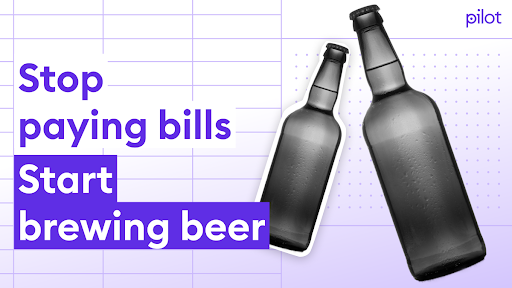How to automate your business’s bank reconciliation

Bank reconciliations can feel like a tedious way to spend your time. Matching financial transactions line by line to bank statements takes up hours every month. Plus, manual bank reconciliation can be an error-prone process that creates more problems than it clears up.
But while bank reconciliations may be tiring, they can protect businesses from spending too much money or even becoming victims of fraud. Bank reconciliation is key for strong financial management.
In this post, we’ll break down the what and why of bank reconciliation, plus how Pilot's bookkeeping services combine powerful software with a human touch to save you time.
Need someone to handle your bookkeeping? Try Pilot Now.
What Is Bank Reconciliation?
Bank reconciliation is the process of matching a company’s monthly bank statement balance to the same month’s cash account balance in the general ledger, also known as the “book balance.” The books are said to be reconciled once the book and bank balance match. This process helps companies catch errors or unusual account activity.
Although discrepancies between the bank balance and the cash account balance are normal, fixing them is imperative. That’s where bank reconciliation comes in.
Why Is Bank Reconciliation Important?
Monthly bank reconciliations are the perfect opportunity to identify potential trouble spots — irregular activity, sub-standard accounting processes, one-time errors — and correct them. Bank reconciliations can protect you against loss from any of these issues.
Regular bank reconciliation protects businesses in different ways:
Cash Management
Bank reconciliations are the best way to catch banking errors that could damage solvency if left unnoticed. For example, reconciliations can reveal if an employee was charged twice for a conference ticket, or if you got a duplicate bill for equipment. These may be unintentional errors, but they can really add up.
Over time, these types of small errors could cause a business to have lower cash balances than expected in the bank. If the business then unwittingly tries to make a payment that they can’t cover, they’ll fall victim to unexpected overdraft fees and bounced checks.
Fraud Prevention
If someone edits a check or overpays an employee, the bank reconciliation is a great place to catch it. Warning signs include:
- Missing deposits
- Unexpected withdrawals or transfers
- Duplicated or amended checks
- Unauthorized checks
Fraud detection is particularly pertinent for startups. After running controlled experiments with purchase managers, Harvard Business Review discovered that purchasers were more likely to try to deceive startup employees and founders than equivalent employees at established firms. Startups need to be extra vigilant against attempted malfeasance, and bank reconciliations are just one way to do that.
Financial management
Skipping bank reconciliation can lead to long-term errors in financial management as well. The three main financial statements — the balance sheet, the income statement, and the cash flow statement — rely on the book and bank balances being reconciled. If they’re not, business owners could be making financial projections and decisions based on flawed information.
That’s why the bank reconciliation is the first thing a bookkeeper or accountant will do every month. “At its core, bank reconciliation ensures we have the complete history of all transactions a customer has made or received throughout that month,” explains Pilot bookkeeper Jess Mersten. “The bank reconciliation means we can do all the other bookkeeping work correctly — categorizing expenses, accounting for outstanding bills, and managing incoming invoices.”
Internal Process Optimization
Bank reconciliations can reveal sub-par internal processes. For example, month-on-month errors in recording invoices and incoming payments indicate weaknesses in Accounts Receivable processing. Systemic issues like this can indicate your business is losing track of transactions and can’t explain where money came from, which can cause big problems around tax time.
If you see repeated errors when you do the bank reconciliation, you should put systems into place to improve the bookkeeping process. At Pilot, we offer a hybrid bookkeeping service that combines human knowledge with powerful software, which helps eliminate errors and optimize business performance.
Find out more about how to hire the right bookkeeping service for your business.
Why Is Bank Reconciliation Challenging for Business Owners?
We know doing bank reconciliations can help optimize internal systems, avoid cash flow woes, and even prevent fraud. So why aren’t small business owners doing bank reconciliations daily if they bring so many benefits?
Because doing a bank reconciliation manually is tedious and time-consuming.
Discrepancies
Discrepancies between the bank balance and the cash account balance can have numerous causes:
- Payments made at the end of one month may not show up on the bank statement until the following month.
- Unexpected bank charges are levied but not yet recorded in the books.
- Checks have been issued to creditors but the payments have not yet processed.
- Deposits are still in transit and have yet to hit the bank account.
- There may be errors in the books or in the bank transactions.
Parsing out these errors is hard enough. Knowing how to correct them is an added difficulty. For example, deposits in transit need to be added to the bank balance total during the bank reconciliation, whereas unexpected bank charges should be subtracted from the book balance.
Time investment
Even if business owners do know how to identify and correct errors, the process is inevitably time-consuming. Most companies, even early-stage startups, make hundreds of payments and deposits per month. They also often have multiple bank accounts and use payment services like PayPal and Stripe.
Business owners who try to find errors by comparing each transaction in the cash account to the transactions in the bank statement will waste hours every month. That time could be better spent, especially for early-stage startup founders who are focused on scaling their business.
Unsurprisingly, such a meticulous and drawn-out process creates a big margin for error. Humans working alone are prone to mis-record or mis-attribute line-by-line transactions. Even companies using an accounting software may find that the integration between the software and their bank isn’t reliable. If your software errors out or fails to pull in all the bank transactions it should, you then have to locate discrepancies manually and correct them.
How Pilot Automates Bank Reconciliation
Pilot tackles the headache of bank reconciliation by providing a new kind of bookkeeping service. With Pilot, you get an experienced bookkeeper with custom software tools at their disposal. This means the repetitive, error-prone parts of bookkeeping are taken care of automatically.
We apply this approach to bank reconciliations as well. When a customer signs up for our service, we start out by getting credentials for their banks and credit cards. This means we can go through and pull the statements behind the scenes without wasting your time.
(Aside: Your financial data is safe with us. Pilot bookkeeper Jess Mersten again, “Founders put so much love and energy into their business, they’re rightly very protective of their financial data. We have a lot of encryption: our founders were in tech security before starting Pilot, so they understand how to keep data safe.”)
Smart automation
Once we have access to the necessary financial institutions, we use software integrations to create a list of monthly transactions. Then we bulk upload that info into QuickBooks. We do all our bookkeeping in QuickBooks because it’s the industry standard.
Pilot then pulls in new transactions for the month and compares the bank balance to the QuickBooks balance. If there’s a discrepancy, it’s down to our human bookkeepers to find out why. For example, say you make a purchase on the 30th of the month and record that in the cash account, but the payment doesn’t register on the bank account til the following month. Pilot bookkeepers will record that as a cleared transaction to correct the balance. We will also make a note of it for the following month to ensure that it reconciles.
“It’s a mix of humans and tools,” says Jess. “The tools pull in the transactions for us, but we’re the ones validating the data and making sure everything is correct. Ideally, you should only be spending at most 30 minutes a month on your books with us, largely to answer any questions that come up about categorizing transactions or the status of your bills and invoices. If you’re doing it without the technology that Pilot provides, then bank reconciliation takes a lot longer.”
Bank Reconciliation Creates a Solid Financial Base
Bank reconciliation may seem like tedious busy work. But regular bank reconciliation is actually an integral part of running a financially sound company.
Reconciliation enables you to identify where your company is spending money, potential areas of fraud, and if minor bank errors are impacting profits. Having a team of bookkeepers and technology on your side means you can easily complete the reconciliation process and get back to running your business.
Need help getting your startup’s bookkeeping in order? Let Pilot handle that, so you can focus on what really matters: making sure your business succeeds.





